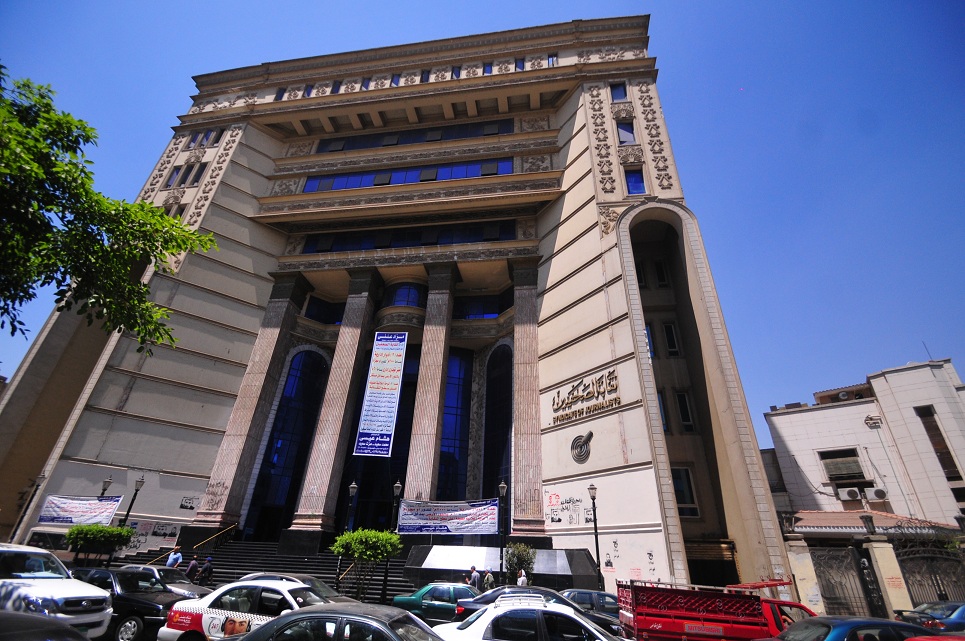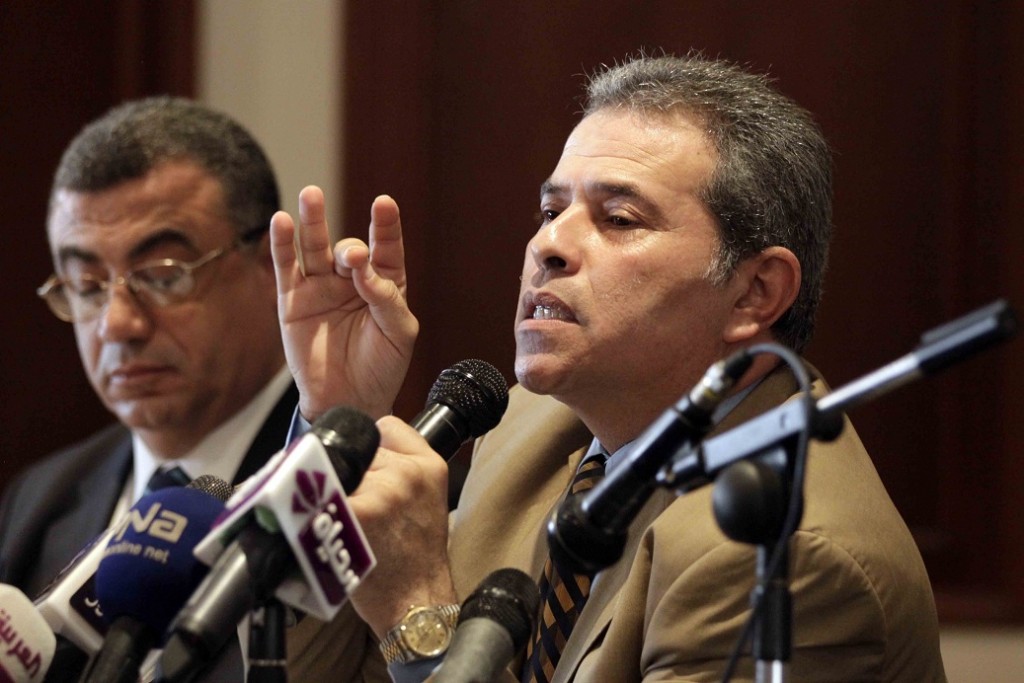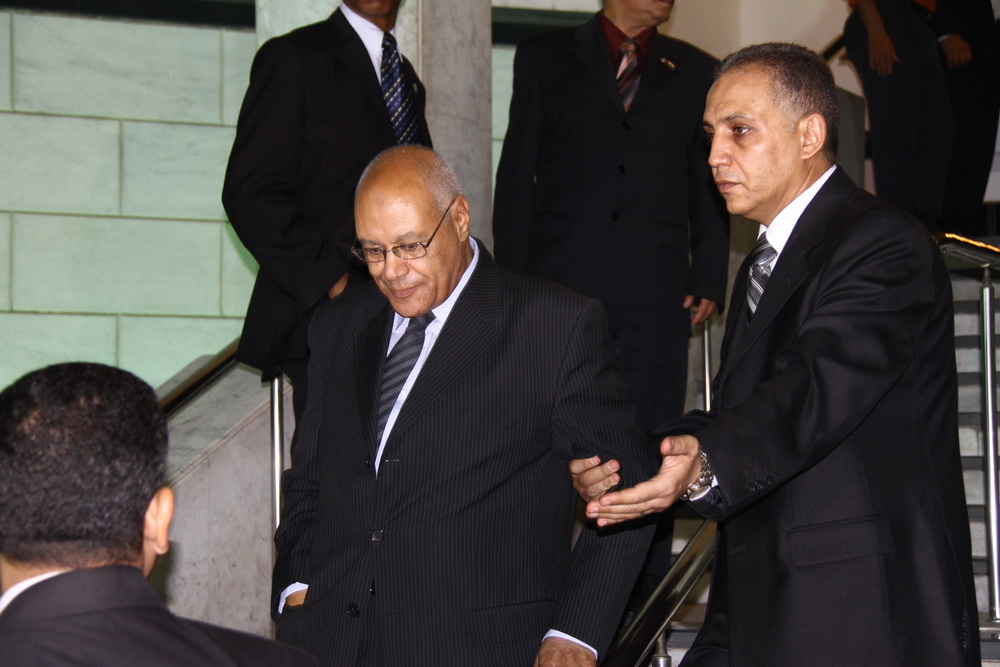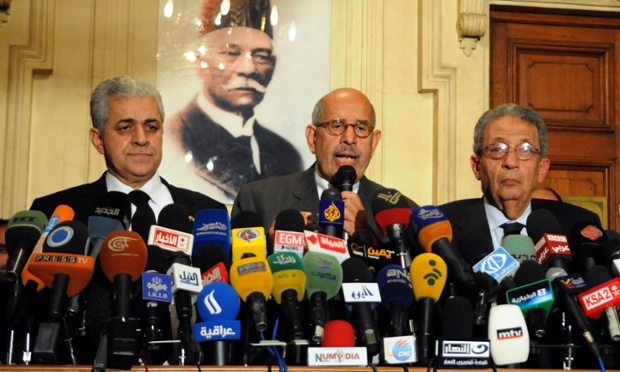
“No one will touch media freedoms. There will be no pens broken, no opinions prevented, no channels or newspapers shut down in my era.” Thus spoke Mohamed Morsy as he scrambled for votes in his bid to become president.
No more than 80 days into his “era,” however, Dostor newspaper editor Islam Afifi and talk show host Tawfiq Okasha are on trial, barely escaping being remanded in custody, and the latter’s TV channel has been temporarily shut down.
The chief editors and board chairmen of all state-owned publications were replaced with candidates picked by the Islamist dominated Shura Council, the upper house of parliament.
Only days after the new appointments, several journalists at these state-owned publications reported they were facing severe internal censorship when it came to criticising the president and his Muslim Brotherhood.
Columns, articles and even full pages were taken off print. Several private newspaper columnists left their columns empty in protest and solidarity.
That same Shura Council also appointed a new Supreme Council of the Press and ensured a majority of its composition was also Islamist.
A new minister of information, after it being promised that the post would be cancelled, was chosen from the Muslim Brotherhood membership. Salah Abd El-Maqsoud is the brother of the group’s lawyer Abd El-Moniem.
Punishing dissidents or fighting slander and misinformation
Tawfiq Okasha is not an icon of independent and objective reporting.
He has claimed on air that Free Masons are behind the Egyptian revolution, warned of them holding a festival at the pyramids on 13/13/2013 before studio staff corrected him, and said Mohamed El-Baradei was not fit for the presidency due to his lack of duck force-feeding knowledge.
In his most recent tirade he claimed Morsy was not the country’s legitimate president and that killing him was justified, although the comment was arguably made in a satirical fashion in response to what Okasha claimed was the Brotherhood issuing a fatwa legalising his killing.
The segment did not go down well and Okasha, who has been a harsh critic of the Brotherhood since around the time of the presidential elections and even more so after Morsy’s victory, found himself facing criminal charges and his channel, Al-Farae’en TV, was pulled off the air for six weeks.
On 1 September Okasha’s trial started in the South Cairo Criminal Court and was postponed to 3 October. He is charged with inciting murder and insulting the president. Insulting the president is an offence that has existed within Egyptian law ever since the monarchy when the charge was insulting the king.
The existence of such a law, “insulting the president,” is by nature a restriction on the freedom the press. All arguments for such a law stem from concepts of respect and morality, but journalism law and journalism ethics are two separate things.
In democracies slander and libel laws, when it comes to public officials, are much more relaxed than when it comes to private citizens, for example.
Many journalists such as Ibrahim Eissa and activists like Karim Amer received prison sentences for “insulting the president” under the rule of former President Hosni Mubarak, although Eissa received a presidential pardon, and the charge has a reputation for being used to stifle dissent.
Okasha’s inciting murder charge, although arguably a bit harsh, is not unfounded. Being charged with insulting the president, however, is a clear attempt to stifle a voice of criticism, and regardless of how ridiculous that voice is, it should not be censored.
It is not only Okasha who is facing possible jail time over “insulting” Morsy. Egyptian daily newspaper Al-Dostor editor-in-chief Islam Afifi is being charged with “insulting the president through publishing false news.”
Al-Dostor has been publishing daily headlines critical of Morsy’s administration and the Muslim Brotherhood ever since the president’s inauguration. The newspaper has been known to publish opinion as news, however, thus lowering its credibility.
The specific article Afifi is being tried for is a news piece in which the paper claimed large amounts of land in the city of Arish were being sold by the state to Palestinians as part of a plan for them to take over Sinai. There is no objective evidence to support the existence of such a plan.
Under Egyptian law, publishing false news is automatically an offence. However, according to press laws in countries with a strong tradition of press freedom, like the United States, false news regarding private citizens is an offence if the citizens are able to prove the reporter was negligent.
When it comes to public figures, however, the standard is higher and the plaintiff has to prove the journalist knowingly published false information. More importantly, publishing offences in such countries are civil rather than criminal offences, so the penalty is always a fine and never jail time.

Mohamed Omar
However, both Okasha and Afifi are facing possible prison sentences. In fact, Afifi was remanded in custody by a judge before Morsy used his legislative powers to cancel the law on precautionary detention for publication offences, and so Afifi was released. Mubarak had already cancelled this law in 1996 however, which means Morsy’s announcement was nothing more than a political gimmick.
Afifi has filed for recusal of the court bench and a decision will be made on 22 September, thus postponing the trial for now. But the campaign against the newspaper did not stop at Afifi.
An issue of the newspaper was confiscated by security forces from the print house before distribution on 11 August after several people filed complaints against the newspaper accusing it of “insulting the president” and causing “strife within society.” A Giza Court upheld the confiscation order and the issue was never distributed.
Taking over the state-owned press and internal censorship
Legal battles with opposition journalists are not the most apparent manifestation of the deterioration of press freedom under Morsy. Perhaps the most obvious measure Morsy and the Brotherhood took to limit opposition in the press was the complete takeover of state-owned publications.
The Shura Council, which currently has an 83 percent Islamist majority, is, among its other duties, the body responsible for appointing officials at state-owned publications.
Such a model where elected politicians appoint journalists to state-owned newspapers that are supposed to be objective and non-partisan is incapable of achieving independence of the state-owned media, which was one of the demands of the 25 January 2011 uprising.
There are exactly 50 publications that belong to seven different state-owned institutions and the Shura Council chose a new editor for every single one of them.
The most prominent publications like the daily Al-Ahram, Al-Akhbar and Al-Gomhoreya as well as the weekly Akhbar Al-Youm and the state-owned Middle East News Agency have all been awarded to editors that come from an Islamist background or are known for their obedience to those in power.
Al-Ahram, the most popular and widely distributed state-owned newspaper for example, has had Abdel Nasser Salama appointed as chief editor. Salama graduated from the school of mass communication at the Islamic Al-Azhar University.
He was known for his opinion pieces full of praise for the former ruling National Democratic Party and he has attacked the 25 January uprising regularly since its outbreak. He was the first person to infamously accuse protestors in Tahrir Square of being paid with Kentucky Fried Chicken meals to protest.
Suleiman Qinawy, the new chief editor of Akhbar Al-Youm, has been editor of the Sout Al-Azhar (voice of Azhar) newspaper and the Azhar Grand Imam website since 2009. He was also a regular contributor to the official newspaper of the Muslim Brotherhood’s political wing, the ruling Freedom and Justice Party.
Gamal Abdel Rehim, new editor of Al-Gomhoreya, is most famous for leading a campaign against a conference for the Bahá’í religious minority that was set to take place in the headquarters of the journalists’ syndicate. His campaign was successful and the conference was cancelled.
These are just a few examples of the editors the Shura Council hired, and within days, the effect of their leadership was felt. Journalists at these newspaper started reporting cases of censorship where articles, columns, and in one instances entire sections, were censored.
The literary page of Al-Akhbar was cancelled by the new editor; the page had featured a column by literary critic Abla El-Roweiny that was critical of the “Ikhwanisation of the state” and another piece by novelist Youssef El-Qaeed titled “No obedience” that was heavily critical of President Morsy.
A regular daily feature on Al-Ahram called “the first one hundred days” that monitored the president’s performance and his adherence to his promises was cancelled as soon as Salama became editor. An article by journalist Tharwat El-Kharbawy on secular states in Islam was also censored.
In response to such instances, several columnists from the privately owned Al-Shorouk, Al-Tahrir and Al-Watan newspapers left their columns empty, some leaving the following note, “this white space is in protest against the Muslim Brotherhood’s conquest over the newspapers and media outlets that belong to the Egyptian people.”
Exerting influence over privately owned publications and public television
The Muslim Brotherhood attempts to control the media did not stop at state-owned publications. The Shura Council also appointed a new Supreme Council of the Press, ensuring that a majority of members would be loyal to the regime.

AFP PHOTO / AHMED MAHMUD
The Supreme Council of the Press is the entity that approved the creation of new publications (private and state-owned) and grants licences. It also helps formulate all press laws, divides paper between the major printing presses (all state-owned), decides the prices of publications (even privately owned ones), and finally it formulates the Egyptian Journalism Code of Ethics.
The new Supreme Council of the Press’s composition also favours Islamists. Other than the speaker of the Shura Council, a Brotherhood member, who has to be on the council ex-officio, other members included the chief editors of the Freedom and Justice and the Salafist Nour Party newspaper editors, the editors and chairmen of state-owned newspapers which the Brotherhood also hired, and Nour Party spokesperson Nader Bakar, who has since declined membership of the council.
By having control over the Supreme Council of the Press, the Muslim Brotherhood is able to control all publications, private or public, through the council’s authority. If there is to be a true end to the state’s control over the press then such a council should not exist at all, no matter who is in power. Yet the Constituent Assembly tasked with drafting Egypt’s new constitution is deliberating having more than one such council.
The Brotherhood’s control over the media extends beyond just the press. Although closing the Ministry of Information has long been a demand of the revolution, President Morsy kept it as part of his government. Furthermore, although most cabinet members were chosen from outside the Brotherhood, the all-important Ministry of Information was given to a loyal Brotherhood member, Salah Abd El-Maqsoud.
Abd El-Maqsoud was a member of the journalists’ syndicate board and editor of several Islamist publications. He wrote columns for the Muslim Brotherhood’s official website and is the brother of the group’s lawyer Abdel-Moniem Abdel-Maqsoud.
He is yet to change the leadership or top brass in state television, popularly nicknamed Maspero, or the influential news sector. Presenters of shows critical of the Brotherhood, however, have complained that their shows have been cancelled.
The overall outlook on freedom the press under Morsy seems gloomy. The Muslim Brotherhood continues to employ the same methods used by Mubarak in stifling the freedom of the media.



